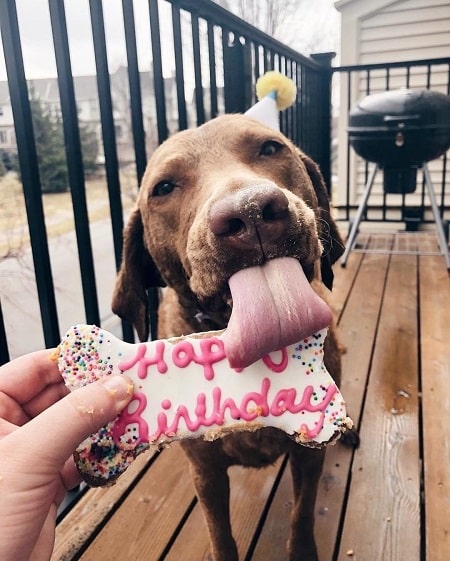Chesapeake Bay Retriever Diets and Supplements
The Chesapeake Bay Retriever is a very energetic dog breed known for its hunting ability and needs more physical training. They require a daily dose of exercise to keep themselves busy. As they are high-energy dogs, Chessie requires proper nutrition and diet for their mind and body development by maintaining their energy level.
In this article, you will learn more about the feeding ways and diets to feed your Chesapeake. Also, you will know about human foods your Chessie can eat and cannot eat.
Diets For Chesapeake Bay Retriever
A proper routine of diet is very essential for Chessie as they spend all their energy in their daily intense activity. They need a proper and right amount of nutrition for their healthy life. You can feed them commercial dog foods or homemade food that contain balanced nutrition.
Protein: Protein is an essential micronutrient that a dog’s body need to build muscle mass and make bones stronger. It can be found in egg, meat, beef, fish, and other vegetables. They are high-breed dogs so, as for Chessies, 20% of protein is beneficial in their diet.
Fats: Fat is yet another important nutrient that should be in your dog’s diet. As it provides adequate energy and makes their coat and skin smooth as well as healthy. About 5%-8% fat is enough in Chessies diet.
Water: Like other micronutrient, Water is one of the main nutrient for you dog body. On average, a body body is made up of 60% of water, so they have to hydrated throughout the day. You can give easy access of water to your dog by keeping a bowl of water by his side for all day long.
How Often Should You Feed Chesapeake Bay Retriever?
The feeding amount is determined by their age, size, weight, and their activity level. A Chessie pup should be fed four meals a day as it’s their growing phase of muscle, brain, and overall body. As your dog reaches 3-6 months old, you can feed 3 meals a day. Always remember not to overfeed them which can lead to obesity and other health problems.

Image Source: Misty Shores Chesapeakes
When your dog reaches the adult phase, feed 2 meals a day. As Chessie is a very active dog, you can increase the number of meals as needed. Provide high-quality food for their health and limit their treat while training.
Dog Food for Chesapeake Bay Retriever
While feeding your dog food, treat them with a completely balanced diet with all the protein and nutrition in it. There is a lot of packed food for dogs in the market however, choosing the correct one is very important.
Here are some of the best dog food that you can feed your Chesapeake Bay Retriever.
- American Journey Beef and Brown Rice Recipe
- Taste of the Land Wetland Formula
- Wellness CORE Puppy Chicken and Turkey Recipe
- Blue Buffalo Freedom Senior Chicken Recipe
Best Supplements for Chesapeake Bay Retriever
Supplements should be given to the dog who is not getting enough nutrition from their daily diet. However, if your dog is getting their required nutrition from its diet supplements are not recommended. Here is the list of supplements you can give to your Chesapeake Bay.
- Glucosamine
- Vitamins
- Antioxidant
- Probiotics
Human Foods That Chesapeake Bay Retriever Can and Cannot Eat
There is a variety of food that humans can eat which is also loved by the dog. Although there is food that your dog can consume and food they cannot. Here is the list of food you can give your dog and it should avoid.

Image Source: Instagram
Can Eat
- Popcorn
- Watermelon
- Apple
- Ham
- Salmon
- Rice
- Bread
- Milk
Cannot Eat
- Ice-cream
- Onion
- Cherry
- Garlic
- Avocado
- Chocolate
- Nuts
- Caffeine
Why is Chesapeake Bay Retriever Not Eating?
- Your Chessie might be having stomach pain or digestion problem. Even a recent vaccination or recent medication might be the reason as it can cause temporary loss of appetite.
- Keep checking your dog’s teeth or gum as loose or broken teeth and swollen gum might also be the reason your dog is not eating properly. Take him to a vet for a check-up if there is a problem in his mouth.
- The sudden change of environment or a trip can also be the reason as they can get motion sickness, uncomfortable, and confused in new surroundings.
Visit Doglime for more dog breed information and their feeding method.
Tags











One thought on “Chesapeake Bay Retriever Diets and Supplements”